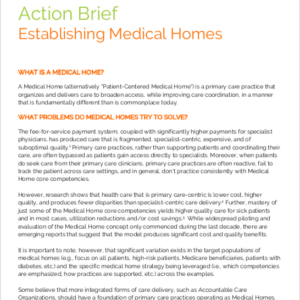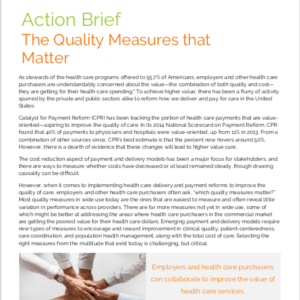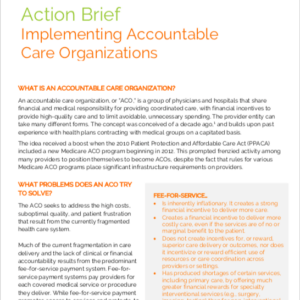Showing 1–9 of 14 results
-

Issue Brief #1: The Case for Public Policy Intervention
Market-based interventions have provided insufficient relief from rising commercial health care costs. As a result, states have a unique and pressing opportunity to enact policies that place downward pressure on unit prices and rebalance market power toward health care purchasers and consumers. The geographic, political, and economic diversity across the 50 United States opens possibilities for state governments to shape their own policy agendas; however, states will likely find that a single piece of legislation proves insufficient to deliver meaningful relief, and/or will create vulnerabilities that are easily exploited by stakeholders who benefit from the status quo. Therefore, state legislators may want to consider combinations or menus of policy options to create complementary infrastructure, close loopholes and plan for contingencies.$0.00Type: Action Brief -

Issue Brief #2: Policies to Prevent/Punish Bad Actors
Market-based interventions have provided insufficient relief from rising commercial health care costs. As a result, states have a unique and pressing opportunity to enact policies that place downward pressure on unit prices and rebalance market power toward health care purchasers and consumers. The geographic, political, and economic diversity across the 50 United States opens possibilities for state governments to shape their own policy agendas; however, states will likely find that a single piece of legislation proves insufficient to deliver meaningful relief, and/or will create vulnerabilities that are easily exploited by stakeholders who benefit from the status quo. Therefore, state legislators may want to consider combinations or menus of policy options to create complementary infrastructure, close loopholes and plan for contingencies.$0.00Type: Action Brief -

Issue Brief #3: Shore up Market Against Consolidation and Rising Prices
Market-based interventions have provided insufficient relief from rising commercial health care costs. As a result, states have a unique and pressing opportunity to enact policies that place downward pressure on unit prices and rebalance market power toward health care purchasers and consumers. The geographic, political, and economic diversity across the 50 United States opens possibilities for state governments to shape their own policy agendas; however, states will likely find that a single piece of legislation proves insufficient to deliver meaningful relief, and/or will create vulnerabilities that are easily exploited by stakeholders who benefit from the status quo. Therefore, state legislators may want to consider combinations or menus of policy options to create complementary infrastructure, close loopholes and plan for contingencies.$0.00Type: Action Brief -

Issue Brief #4: Empower Existing Market Balancers
Market-based interventions have provided insufficient relief from rising commercial health care costs. As a result, states have a unique and pressing opportunity to enact policies that place downward pressure on unit prices and rebalance market power toward health care purchasers and consumers. The geographic, political, and economic diversity across the 50 United States opens possibilities for state governments to shape their own policy agendas; however, states will likely find that a single piece of legislation proves insufficient to deliver meaningful relief, and/or will create vulnerabilities that are easily exploited by stakeholders who benefit from the status quo. Therefore, state legislators may want to consider combinations or menus of policy options to create complementary infrastructure, close loopholes and plan for contingencies.$0.00Type: Action Brief -

Issue Brief #5: Regulate Provider Prices
Market-based interventions have provided insufficient relief from rising commercial health care costs. As a result, states have a unique and pressing opportunity to enact policies that place downward pressure on unit prices and rebalance market power toward health care purchasers and consumers. The geographic, political, and economic diversity across the 50 United States opens possibilities for state governments to shape their own policy agendas; however, states will likely find that a single piece of legislation proves insufficient to deliver meaningful relief, and/or will create vulnerabilities that are easily exploited by stakeholders who benefit from the status quo. Therefore, state legislators may want to consider combinations or menus of policy options to create complementary infrastructure, close loopholes and plan for contingencies.$0.00Type: Action Brief -

Issue Brief #6: Pick the Low-Hanging Fruit
Market-based interventions have provided insufficient relief from rising commercial health care costs. As a result, states have a unique and pressing opportunity to enact policies that place downward pressure on unit prices and rebalance market power toward health care purchasers and consumers. The geographic, political, and economic diversity across the 50 United States opens possibilities for state governments to shape their own policy agendas; however, states will likely find that a single piece of legislation proves insufficient to deliver meaningful relief, and/or will create vulnerabilities that are easily exploited by stakeholders who benefit from the status quo. Therefore, state legislators may want to consider combinations or menus of policy options to create complementary infrastructure, close loopholes and plan for contingencies.$0.00Type: Action Brief -

Action Brief: Establishing Medical Homes
Learn about the medical home model, how it focuses on primary care and the patient, what others have tried and implemented, and actions employer-purchasers can take to offer a medical home to their covered population.$49.00Type: Action BriefBuy -

Action Brief: The Quality Measures That Matter
When it comes to implementing health care delivery and payment reforms to improve the quality of care, employers and other health care purchasers often ask, “which quality measures matter?” Learn about CPR's priority set of quality measures and how employers and purchasers can put them to good use.$49.00Type: Action BriefBuy -

Action Brief: Implementing Accountable Care Organizations
Use the ACO Action Brief to learn about accountable care organizations (ACOs), how these models focus on the patients’ total spectrum of care, what others have tried and implemented, and actions purchasers can take to offer an ACO to their population.$49.00Type: Action BriefBuy
- 1
- 2
